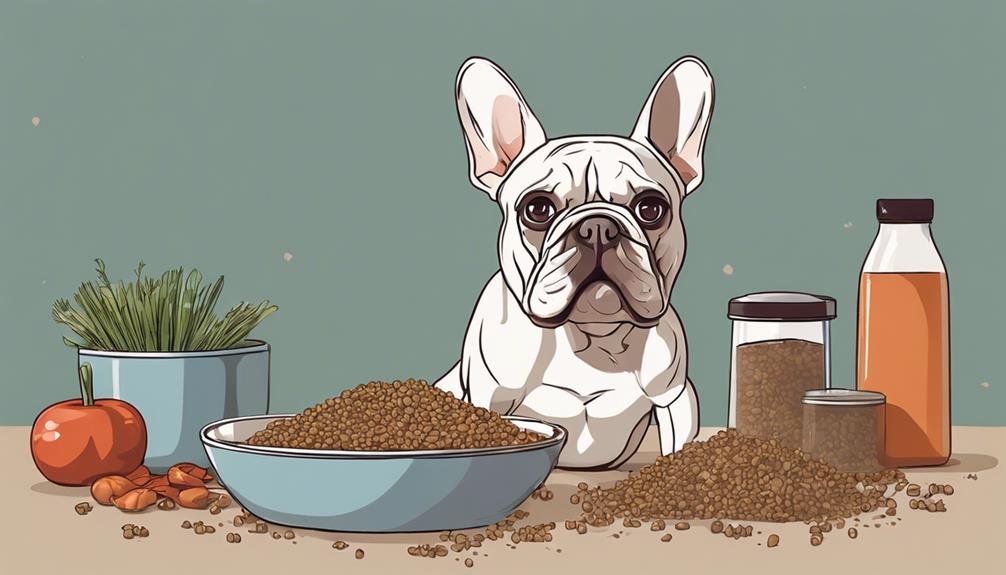Optimal Diet Solutions for Sensitive French Bulldogs
You might think French Bulldogs have delicate stomachs just for fun, but when it comes to their diet, sensitivity is no joking matter.
Understanding the intricate balance of nutrients and ingredients that can soothe your Frenchie's digestive woes is crucial for their well-being.
Stay tuned to uncover the key elements of an optimal diet that can bring relief and comfort to your sensitive French Bulldog, ensuring their health and happiness for years to come.
Common French Bulldog Digestive Issues
If your French Bulldog experiences digestive issues, it's essential to identify common triggers for their discomfort. Some French Bulldogs may have sensitive stomachs, leading to issues such as diarrhea, gas, or vomiting. One way to address these problems is by carefully selecting dietary supplements and incorporating homemade recipes into their diet.
Dietary supplements can play a crucial role in promoting digestive health for French Bulldogs. Probiotics, for example, can help maintain a healthy balance of gut bacteria, reducing the likelihood of digestive issues. These supplements can come in various forms such as powders, capsules, or even specialized dog treats. Including probiotics in your French Bulldog's diet may aid in improving their overall digestive function.
In addition to supplements, homemade recipes can be a beneficial addition to your French Bulldog's diet. By preparing meals at home, you have control over the ingredients, ensuring that your dog receives a balanced and easily digestible diet. Simple recipes using lean proteins, cooked vegetables, and whole grains can help alleviate digestive discomfort. Avoiding ingredients that are known to trigger sensitivities in French Bulldogs, such as dairy or certain grains, can also contribute to a healthier digestive system.
Signs of a Sensitive Stomach
Look out for telltale signs that your French Bulldog may have a sensitive stomach. Dietary intolerances can manifest in various ways in your furry friend. One of the most common signs is digestive discomfort. Keep an eye out for symptoms like frequent flatulence, loose stools, vomiting, or diarrhea. If you notice your French Bulldog experiencing these issues regularly, it may be a sign of a sensitive stomach.
Additionally, changes in appetite can also indicate a sensitive stomach. If your French Bulldog suddenly loses interest in food or starts to eat less, it could be due to digestive issues. On the other hand, an increased appetite accompanied by digestive discomfort might suggest that your pup is trying to soothe an upset stomach by eating more.
Furthermore, pay attention to your French Bulldog's overall behavior. Irritability, lethargy, or restlessness can sometimes be linked to gastrointestinal issues. If your usually playful and energetic pup seems off, it might be worth investigating further to see if their tummy is causing them discomfort.
Importance of High-Quality Ingredients
Choosing a diet with high-quality ingredients is crucial for maintaining your French Bulldog's overall health and well-being. When it comes to sensitive Frenchies, paying attention to ingredient sourcing is key. High-quality ingredients sourced from reputable suppliers can help prevent allergies and digestive issues in your furry friend. Opt for dog food brands that prioritize quality ingredients and avoid fillers, artificial flavors, and preservatives.
Nutrient absorption is another critical aspect impacted by ingredient quality. High-quality ingredients are more digestible for your French Bulldog, ensuring they can absorb essential nutrients effectively. This is especially important for Frenchies with sensitive stomachs, as they may struggle with poor digestion and nutrient absorption when fed low-quality foods. Look for dog foods that contain easily digestible proteins, carbohydrates, and fats to support your pup's overall health.
Best Protein Sources for Frenchies
Selecting lean protein sources is essential for optimizing the diet of your French Bulldog. When considering protein alternatives for your Frenchie, lean options like chicken, turkey, fish, and lean cuts of beef or lamb are excellent choices. These protein sources provide essential amino acids necessary for your dog's muscle development and overall health.
When looking for the best protein sources for your French Bulldog, it's important to consider their digestive health. Frenchies can sometimes have sensitive stomachs, so incorporating protein sources that are easy to digest can be beneficial. Additionally, including digestive enzymes in their diet can help improve the breakdown and absorption of proteins, aiding in your Frenchie's overall digestion.
Incorporating a variety of protein sources into your French Bulldog's diet can also help prevent any potential food sensitivities or allergies from developing. Rotating between different protein options ensures that your Frenchie receives a well-rounded diet while minimizing the risk of developing intolerances.
Essential Nutrients for Digestive Health
To promote optimal digestive health in your French Bulldog, ensuring they receive essential nutrients is crucial for their overall well-being. Two key components that can greatly benefit your Frenchie's digestive system are probiotic supplements and digestive enzymes.
Probiotic supplements contain beneficial bacteria that support the balance of gut flora in your dog's digestive tract. These good bacteria help in breaking down food, absorbing nutrients, and supporting the immune system. Including probiotics in your French Bulldog's diet can aid in preventing digestive issues such as gas, bloating, diarrhea, and constipation.
Digestive enzymes are another essential nutrient that can improve your Frenchie's digestion. These enzymes help break down food into smaller, more easily digestible components, allowing your dog to absorb nutrients more efficiently. By including digestive enzymes in your French Bulldog's diet, you can help alleviate digestive issues and ensure that your pup is getting the most out of their meals.
Incorporating probiotic supplements and digestive enzymes into your French Bulldog's diet can significantly enhance their digestive health. These essential nutrients work together to promote a healthy gut environment, improve nutrient absorption, and reduce the risk of digestive disturbances. Remember, a well-balanced diet rich in these key nutrients is essential for keeping your sensitive French Bulldog happy and healthy.
Avoiding Common Allergens
Steer clear of potential allergens in your French Bulldog's diet to safeguard their health and well-being. When selecting treats for your furry friend, opt for allergen-free options to prevent any adverse reactions. Look for treats that are specifically labeled as hypoallergenic or free from common allergens like wheat, soy, and corn. These treats can help prevent digestive upsets and skin irritations in sensitive French Bulldogs.
In addition to choosing allergen-free treats, consider incorporating homemade meal options into your French Bulldog's diet. By preparing meals at home, you have full control over the ingredients, ensuring that no potential allergens are included. Homemade meals can be tailored to your French Bulldog's specific dietary needs, making them a great option for dogs with sensitivities.
When preparing homemade meals, focus on using simple, whole food ingredients such as lean proteins like turkey or fish, healthy fats like coconut oil, and easily digestible carbohydrates like sweet potatoes or quinoa. Avoid common allergens like dairy, wheat, and artificial additives that could trigger allergic reactions in your French Bulldog. By being mindful of the ingredients you use and opting for allergen-free treats, you can help keep your sensitive French Bulldog healthy and happy.
Transitioning to a New Diet

To ensure a smooth adjustment for your French Bulldog's dietary changes, gradually introduce new foods over a period of time. Start by slowly incorporating small amounts of the new diet into your dog's current meals. This slow introduction allows your dog's digestive system to adapt gradually without causing any sudden upsets.
Monitoring progress during this transition phase is crucial. Keep an eye on your French Bulldog for any signs of digestive issues such as vomiting, diarrhea, or changes in behavior. If you notice any negative reactions, pause the transition and consult with your veterinarian for guidance.
Throughout the transition period, observe your dog's appetite, energy levels, and overall well-being. Make note of any changes or improvements you see as you introduce the new diet. This information will be valuable when evaluating the effectiveness of the new diet for your sensitive French Bulldog.
Consulting a Veterinarian for Guidance
Seeking guidance from a veterinarian is essential when navigating dietary changes for your French Bulldog. Your vet can provide valuable insight tailored to your Frenchie's specific needs. If your pup requires dietary supplements, your veterinarian can recommend the appropriate ones based on their health condition. Whether it's vitamins, probiotics, or omega-3 fatty acids, these supplements can support your dog's overall health and well-being.
When dealing with special dietary restrictions, consulting a veterinarian becomes even more crucial. French Bulldogs may have allergies or sensitivities to certain ingredients, requiring a specialized diet. Your vet can help identify these allergens and guide you towards suitable alternative options. They can also advise you on how to ensure your Frenchie receives all the necessary nutrients despite the restrictions.
Moreover, your veterinarian can assist in monitoring your French Bulldog's progress once dietary changes have been implemented. Regular check-ups can help track your pup's weight, digestion, and overall health to ensure the new diet is meeting their needs effectively. By working closely with your vet, you can make informed decisions regarding your Frenchie's diet and well-being.
Frequently Asked Questions
Can French Bulldogs With Sensitive Stomachs Benefit From Probiotics or Digestive Enzymes in Their Diet?
If you have a French Bulldog with a sensitive stomach, they can benefit from probiotics or digestive enzymes in their diet.
Probiotics can help improve gut health by introducing good bacteria, while enzymes aid in better digestion of food.
Additionally, incorporating prebiotics can further support the growth of beneficial bacteria in the gut.
It's essential to consult with your vet to determine the best approach for your furry friend's unique needs.
Are There Any Specific Fruits or Vegetables That French Bulldogs With Sensitive Stomachs Should Avoid?
Avoid feeding your sensitive French Bulldog high-fiber fruits like apples or pears, as these can lead to digestive issues. Opt for easily digestible vegetables such as cooked sweet potatoes or green beans.
Remember, hydration is crucial, so include water-rich options like cucumber. Control portion sizes to prevent stomach upset.
How Can I Prevent My French Bulldog From Developing Food Sensitivities in the Future?
To prevent your French Bulldog from developing food sensitivities in the future, try breed-specific diets and take preventative measures.
Introduce new foods gradually, avoid sudden changes in diet, and opt for high-quality, easily digestible ingredients.
Consult with your veterinarian for tailored advice on the best diet for your pup.
Is It Safe to Feed My French Bulldog a Raw Diet if They Have Digestive Issues?
If your French Bulldog has digestive issues, feeding a raw diet can be risky due to the raw diet controversy and potential dietary restrictions. It's essential to consult with your vet before making any drastic changes to ensure your pup's safety and well-being.
Opt for a balanced diet that meets your Frenchie's specific needs, taking into account their sensitivities and health concerns. Prioritize their health above trendy feeding fads for the best outcome.
Are There Any Natural Remedies or Supplements That Can Help Alleviate Digestive Issues in French Bulldogs?
If your French bulldog is struggling with digestive issues, there are natural ways to help.
Herbal remedies, homeopathic solutions, Traditional Chinese medicine, and essential oils can all offer relief.
Consider incorporating gentle herbs like chamomile or peppermint, or trying probiotics to support gut health.
Always consult with your vet before starting any new supplements to ensure they're safe and appropriate for your pup's specific needs.
Conclusion
In conclusion, keeping your sensitive French Bulldog's diet in mind is crucial for their digestive health. By choosing high-quality ingredients, avoiding common allergens, and consulting with your veterinarian, you can ensure your pup stays happy and healthy.
Remember to pay attention to any signs of a sensitive stomach and make necessary adjustments to their diet for optimal well-being. Your furry friend will thank you for providing them with the best nutrition possible.
